2018-2019学年英语人教版必修3学案:Unit+1+Section++Ⅲ++Grammar—情态动词(Ⅰ)
高一人教版英语必修三unit1学生优秀学案

功到自然成
助你学业成功
功成教育个性化教学辅导教案
学 科
English 古皓华
任课老师 年 级
Mr
Yang
授课时间 学 点重点 课后作业
高 一
必修三 unit1 词语辨析
词汇句型精讲 精练
教 必修 3
学
Unit1
过
程 内容要点
1. mean 的用法 1). mean doing sth. mean doing sth. 的意思是“意味着(必须要做某事或导致种结果) ”, 其主语通常是指事物的词。 2). mean to do sth. mean to do sth. 的意思是“打算或企图做某事” ,其主语通常是表示人的名词或代词,其过去完成 式表示“本来打算做某事” 。 3). mean sb. to do sth. mean sb. to do sth. 的意思是“打算让某人做某事” ,也可以用于被动结构。 4). mean 后接名词、副词或从句 mean 后接名词或副词,意为“表示;打算;存心”等意思;后接 that 从句,意为“表示„„” 。 5). be meant for 该短语的意思是“打算给予;打算作„„用” 。 In some parts of London, missing a bus means _____ for another hour. A. waiting B. to wait C. wait D. to be waiting 2. take place 发生;举行 ① The performance didn’t take place after all. 演出终于没有进行。 ② Was there anybody passing by when the accident took place? 事故发生时,有人路过那里吗? 与 place 相关短语: in the first place (用于列举理由)首先,第一点;in the last place 最后 in one’s place 处于某人的位置,为某人设身处地想一想 in place 放在原来的位置,就位;in place of 代替,用„„而不用„„ take one’s place 找替某人接替某人的位置 ★take place 不能用于被动语态中 3. of all kinds 各种各样的 【归纳】 all kinds of 各种各样的 ; the same kind of 相同种类的 different kinds of 不同种类的 ; this/that kind of 这(那)种 a kind of 某种 课堂成就梦想 细节决定未来
2018-2019版英语新学案同步人教必修三全国通用版讲义Unit 1 Word版含答案

Section_ⅠWarming Up & Reading — Pre-reading1.There are many festivals in the world. What festivals do you like most?2.Do you like the Spring Festival in China? Try to tell your partner something interesting about the Spring Festival.The Spring Festival is the biggest festival for Chinese people all around the world. The celebration usually lasts for 15 days or so. There is a lot to do during this time.On the eve of the Spring Festival, red couplets (春联) are posted on doors. Family members usually get together and have big meals. Their favorite dish on this day is dumplings.Days before the Spring Festival, families will clean their homes. People think cleaning sweeps away bad luck. It makes the house ready for good luck.The color red is everywhere during the Spring Festival. People think red is a happy color and will bring them a bright future. People wear red, too. They decorate their homes with pieces of red paper. Kids get a lot of “hong bao”. It is a red paper bag with money in it. Usually, older people give younger ones “hong bao”. They think it brings good luck. When the children get their lucky money, they always give their best regards with good words.The Spring Festival is the time to make everybody happy. So don't say any bad words or do anything that will bring unhappiness to other people. For instance, you'd better not say any bad words like “death”. Don't break anything. People think that it means your good luck is running out.Also, don't borrow or lend money on these days. If you have borrowed money, return it before the Spring Festival.There are a lot of activities celebrating the Spring Festival, such as different evening parties and dancing, but the most popular ones are dragon dances and lion dances.Warming UpThere are many festivals at home and abroad. Some are religious, and some are for special people or events. Discuss and try to match them with the pictures.1.the Spring Festival________2.Mid-autumn Festival ________3.Obon (Japan) ________4.Valentine's Day ________5.Christmas ________6.Halloween ________7.the Dragon Boat Festival ________8.Columbus Day (USA) ________9.National Festival on October 2 (India) ________答案:1~5EFDAB6~9CHGIFast ReadingScan the passage and then choose the best answers according to the passage. 1.Most ancient festivals were held in order to________.A.celebrate the end of cold weatherB.celebrate harvest in autumnC.celebrate planting in springD.all of the above2.In which country do people celebrate the Day of the Dead in early November? A.Japan.B.Mexico.C.America.D.India.3.What is Columbus Day in the USA for?A.In memory of the arrival of Christopher Columbus in the New World.B.In order to satisfy their ancestors.C.In order to offer food, flowers and gifts to the dead.D.In order to celebrate the return of Jesus from the dead.4.The biggest difference between the Chinese Spring Festival and Easter in Christian countries lies in ________ functions.A.cultural B.politicalC.religious D.educational5.Which of the following festivals is to honour the dead?A.Obon. B.Mid-autumn Festival.C.Easter. D.Cherry Blossom Festival.答案:1~5DBACACareful Reading1.Read the passage and write down the main idea of it.The text mainly tells us about some of today's festivals. There are three kinds of festival.Some are religious,_some are seasonal and some are for special_people_or_events.2.Which sentence in the passage can be replaced by the following one?All kinds of festivals and celebrations have taken place everywhere since thousands of years ago.Festivals_and_celebrations_of_all_kinds_have_been_held_everywhere_since_ancient_times.3.According to Paragraph 2, list three facts about the holiday Halloween.①It's_a_holiday_for_the_dead.②It's_now_a_children's_holiday.③Children_can_dress_up_and_ask_for_sweets.4.What do people do in the Spring Festival in China?Eating_dumplings,_fish_and_meat;_giving_children_lucky_money_in_red_paper;_watching _dragon_dances_and_carnivals.5.What does Easter celebrate?It_celebrates_the_return_of_Jesus_from_the_dead_and_the_coming_of_spring_and_new_li fe.6.Complete the following sentence with words from Paragraph 5. (3 words)In China, the Spring Festival is a lively day when people say “goodbye” to winter and look_forward_to the arrival of spring.SummaryRead the passage carefully and fill in the blanks.There are all kinds of festivals throughout the world, festivals 1.to_satisfy (satisfy) and please the ancestors, to honour some famous people or important events, and to express people's 2.gratitude (grateful) to the God 3.for bringing them a year of plenty. For example, Japanese observe Obon, 4.when people go to clean the graves and light incense in memory of their ancestors. In India, October 2 is 5.a national festival to honour Mahatma Gandhi who helped India become an 6.independent (depend) country. And in China the Spring Festival, which 7.is_celebrated (celebrate) in January or February, is the most 8.energetic (energy) and important because it is a festival that looks forward to the coming of spring. Why are all these festivals everywhere?Because 9.during the festivals, people can get together to eat, drink and have fun with each other, 10.forgetting (forget) all the daily struggle and demands for a while.DiscussionShould we, Chinese students, celebrate Western festivals like Christmas? Why or why not?Yes._Because_we_can_share_our_happiness_with_each_other_and_increase_mutual_under standing_by_celebrating_Western_festivals._Meanwhile,_we_can_learn_more_about_Western_c ulture.Section_ⅡWarming Up & Reading — Language Points(一)根据英文释义和首字母提示写出单词1.award:to give something to somebody such as a prize or money for something they have done2.trick:_to make someone believe something that is not true3.gain:to get or achieve something, usually as a result of a lot of effort4.gather:_to get, come or bring together5.starve:to suffer or die because you do not have enough to eat(二)用所给词的适当形式填空6.They celebrated his success and the celebration lasted four hours.(celebration)7.We believe in his ability, and the belief resulted from his behavior.(belief)8.They gained independence in 1969, and now they are a proud and independent people.(independence)9.Agricultural development lies in the science of agriculture.(agriculture)10.Auckland is a city full of energy,_where everyone seems energetic.(energetic)1.starve vi.& vt.(使)挨饿;饿得要死;(使)饿死vi.渴望;极需要★背诵佳句培养语感(教材原句)At that time people would starve if food was difficult to find, especially during the cold winter months.在那个时代,如果食物难以找到,特别是在寒冷的冬月,人们会挨饿。
【同步导学】2018-2019学年人教版高中英语必修三导学案Unit1FestivalsaroundtheWorldreading

M3 Unit 1 Festivals around the WorldSection II Warming up & Reading学习目标1. 本课时为阅读课,,了解世界各地的主要节日,如亡灵节,丰收节,春节等的来源习俗。
2. 学习“总—分—总”的语篇模式,能有条理的介绍事物,培养跨文化意识。
学习重难点1.单词及短语:be meant to, lead sb. to do, as though/if2.句式:sb /sth be+ adj. + to do; There is no fun in doing sth学法指导1、略读(Skimming)2、跳读(Skipping)3、猜测生词(Guessing the new words)学习过程Task 1: 语篇领悟Task One:Look at the table below and tell the date of each festival. Then choose one of them and talk something about it briefly to introduce one kind of festival in your local area.Festivals Date Festivals DateJanuary 1st Lunar New YearMarch 8the 15 day of the 1stlunar monthTeachers’ DayInternational LaborDayOctober 1stthe fifth day of thefifth lunar monthChinese Youth Day Army DayJune 1st the 5th day of the 8thlunar monthTask Two:Voice your opinionDescribe one of the festivals and tell the reason to your classmates. Try to use the following expressions: The festival that I think…is…/It falls on…/It dates back to…with a long history./There are many colorful activities../I attac h importance to…/ because it not only…but also…Task 2: 典句探究1. Festivals are meant to celebrate important times of year. (P1)1) This dog android is meant to guide blind people crossing the street.2) The activity is meant to improve the students’ oral E nglish.拓展: 短语为________,意思是:________ n. ________ v. ________adj. ________活用:1) The flashing lights mean that the road is blocked.2) What on earth do you mean?3) This new order will mean (us) working overtime.4) I only meant to help.5) Your friendship means a great deal to me.6) His family means nothing to him.翻译: means n.1) by all means __________________2) by means of __________________3) by no means __________________2. At that time people would starve if food was difficult to find, especially during the cold winter months. (P1)提炼:sb /sth be+ adj. + to do是一个重要的句式结构, _______的形式表示被动的意义。
【高中英语】2018最新人教新课标高中英语必修三:unit1 Project 教案
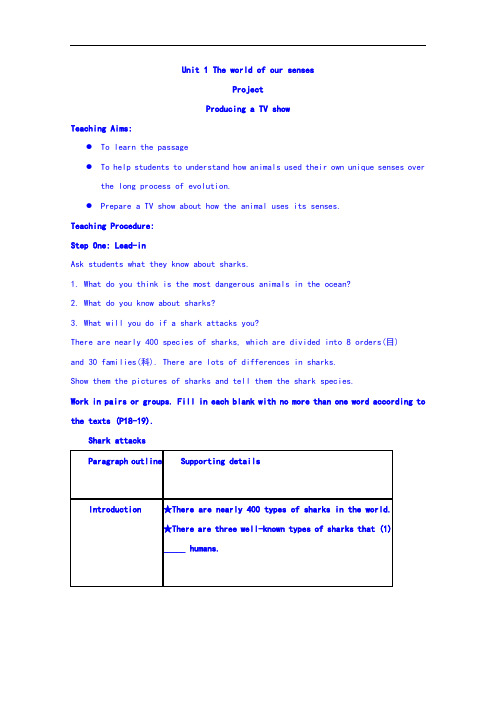
shark attaБайду номын сангаасks
How do they find t heir way ★Pigeons may have a compass inside them to help them find (10) _____. ★Pigeons also use their sight and sense of smell to help them find their way home.
答案: 1. attack 2. tasting 3. nose 4. sudden 5. wounds 6. alone 7. eye 8. Ancient 9. direction 10. north Step Two: Reading the article about shark attacks 1. Fast reading. Ask students some questions about the passage. How many different types of sharks are there in the ocean? Nearly 400. Do all of them attac k humans? No. Only about 30 types are known to have attacked human beings. What is the most dangerous shark? The great white shark. What sharks are also rather dangerous? Two other sharks are also rather dangerous: the tiger shark and the bull shark. 2. Detailed reading. Help students to get detailed information about sharks. The three types of shark attacks: In the main type, the shark attacks you because it mistakes you for a fish, but
2018高中英语人教版必修三教学案:Unit 1 Section 1 Word版含答案
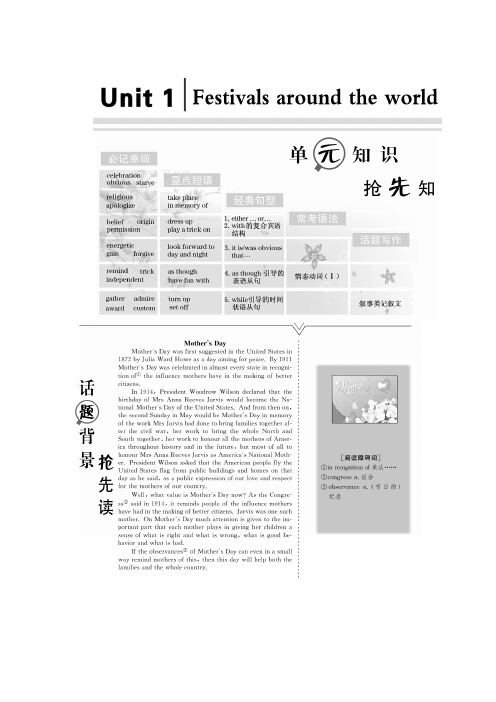
Ⅰ.Match the word with its meaning.1.gain A.农业;农学2.feast B.独立;自主3.starve C.节日;盛宴4.origin D.获得;得到5.belief E.收获;收割6.arrival F.奖品;授予7.gather G.习惯;风俗8.award H.赞美;钦佩9.admire I.(使)饿死;饿得要死10.custom J.搜集;集合;聚集11.harvest K.到来;到达;到达者12.religious L.起源;由来;起因13.energetic M.信任;信心;信仰14.independence N.宗教上的;信奉宗教的;虔诚的15.agriculture O.充满活力的;精力充沛的;积极的答案:1~5DCILM6~10KJFHG11~15ENOBAⅡ.Write down the meaning of phrases in each sentence.1.The 2016 Olympic Games took place in Rio de Janeiro, Brazil.发生;举行2.They will build a monument in memory of the national hero.为了纪念3.Her sister helped her to dress up for the party.打扮4.If the children do not get any sweets, they might play a trick on the neighbour.搞恶作剧5.We have been looking forward to meeting the famous actor some day.期待6.The PLA (中国人民解放军) men defend our great motherland day and night.日夜7.He completely ignored all these facts as though they never existed.好像8.Did you have fun with Uncle Joey today?玩得开心。
【高英】2018-2019最新人教新课标高中英语必修三:unit1 Reading 教案
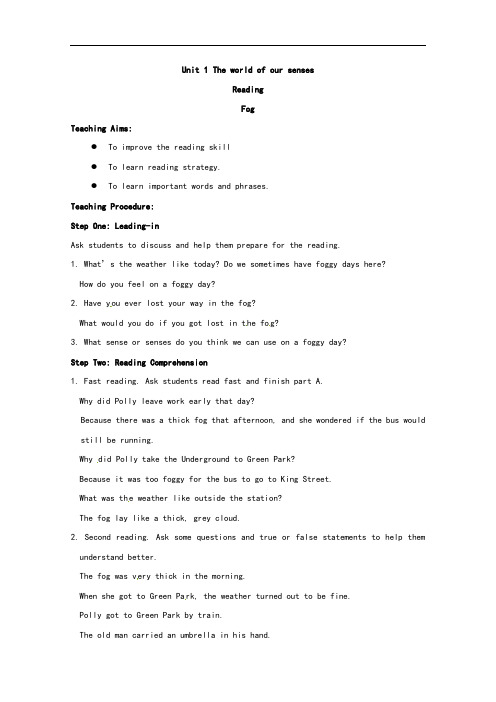
Unit 1 The world of our sensesReadingFogTeaching Aims:●To improve the reading skill●To learn reading strategy.●To learn important words and phrases.Teaching Procedure:Step One: Leading-inAsk students to discuss and help them prepare for the reading.1. What’s the weather like today? Do we sometimes have foggy days here?How do you feel on a foggy day?2. Have y ou ever lost your way in the fog?What would you do if you got lost in t he fo g?3. What sense or senses do you think we can use on a foggy day?Step Two: Reading Comprehension1. Fast reading. Ask students read fast and finish part A.Why did Polly leave work early that day?Because there was a thick fog that afternoon, and she wondered if the bus would still be running.Why did Polly take the Underground to Green Park?Because it was too foggy for the bus to go to King Street.What was th e weather like outside the station?The fog lay like a thick, grey cloud.2. Second reading. Ask some questions and true or false statements to help themunderstand better.The fog was v ery thick in the morning.When she got to Green Pa rk, the weather turned out to be fine.Polly got to Green Park by train.The old man carried an umbrella in his hand.。
【——人教版高一英语】必修三unit1教案
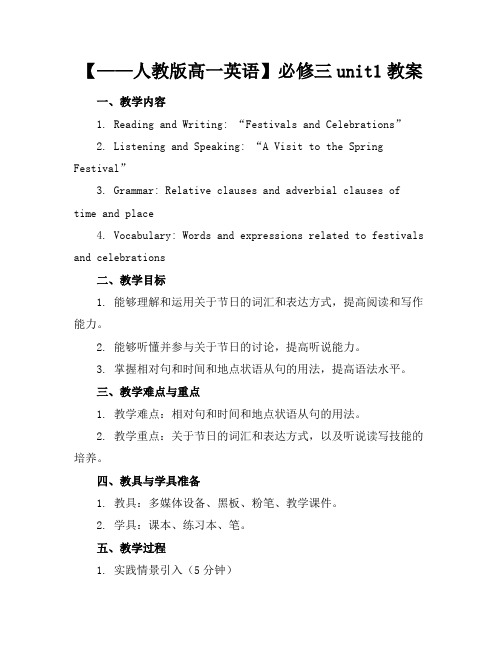
【——人教版高一英语】必修三unit1教案一、教学内容1. Reading and Writing: “Festivals and Celebrations”2. Listening and Speaking: “A Visit to the Spring Festival”3. Grammar: Relative clauses and adverbial clauses of time and place4. Vocabulary: Words and expressions related to festivals and celebrations二、教学目标1. 能够理解和运用关于节日的词汇和表达方式,提高阅读和写作能力。
2. 能够听懂并参与关于节日的讨论,提高听说能力。
3. 掌握相对句和时间和地点状语从句的用法,提高语法水平。
三、教学难点与重点1. 教学难点:相对句和时间和地点状语从句的用法。
2. 教学重点:关于节日的词汇和表达方式,以及听说读写技能的培养。
四、教具与学具准备1. 教具:多媒体设备、黑板、粉笔、教学课件。
2. 学具:课本、练习本、笔。
五、教学过程1. 实践情景引入(5分钟)利用多媒体展示世界各地节日的图片,引导学生谈论他们所了解的节日,激发兴趣。
2. 阅读与写作(20分钟)1)学生阅读“Festivals and Celebrations”部分,理解文章大意。
2)教师讲解关于节日的词汇和表达方式,并指导学生进行写作练习。
3. 听力与口语(20分钟)1)学生听“Spring Festival”的对话,回答相关问题。
2)教师组织学生进行小组讨论,分享他们最喜欢的节日。
4. 语法讲解(15分钟)1)教师讲解相对句和时间和地点状语从句的用法。
2)学生进行语法练习,巩固所学知识。
5. 随堂练习(10分钟)学生完成课堂练习,检测对本节课知识点的掌握情况。
六、板书设计1. 关于节日的词汇和表达方式2. 相对句和时间和地点状语从句的用法3. 课堂练习答案七、作业设计1. 作业题目:1)根据课堂所学,写一篇关于你最喜欢的节日的短文。
【同步导学】2018-2019学年人教版高中英语必修三导学案Unit1FestivalsaroundtheWorldwords
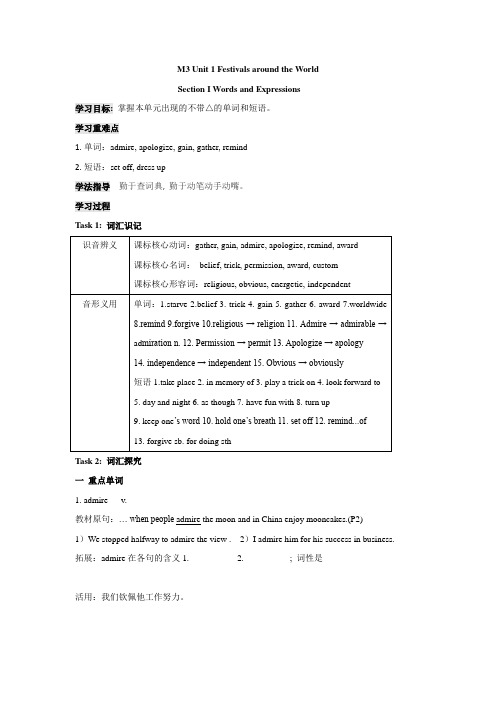
M3 Unit 1 Festivals around the WorldSection I Words and Expressions学习目标:掌握本单元出现的不带△的单词和短语。
学习重难点1.单词:admire, apologize, gain, gather, remind2.短语:set off, dress up学法指导勤于查词典, 勤于动笔动手动嘴。
学习过程Task 1: 词汇识记识音辨义课标核心动词:gather, gain, admire, apologize, remind, award课标核心名词:belief, trick, permission, award, custom课标核心形容词:religious, obvious, energetic,independent音形义用单词:1.starve 2.belief 3. trick 4. gain 5. gather 6. award 7.worldwide8.remind 9.forgive 10.religious → religion 11. Admire → admirable →ad miration n. 12. Permission → permit 13. Apologize → apology14. independence → independent 15. Obvious → obviously短语1.take place 2. in memory of 3. play a trick on 4. look forward to5. day and night6. as though7. have fun with8. turn up9. keep one’s word 10. hold one’s breath 11. set off 12. remind...of13. forgive sb. for doing sthTask 2: 词汇探究一重点单词1. admire v.教材原句:… when people admire the moon and in China enjoy mooncakes.(P2)1)We stopped halfway to admire the view . 2)I admire him for his success in business. 拓展:admire在各句的含义1. __________ 2. __________; 词性是________________活用:我们钦佩他工作努力。
2020-2021学年高中英语人教(2019)版必修三Unit 1 学案

Unit 1 Festivals and CelebrationsReading for WritingWrite about your festival experience课型:新授课课时:2课时班级:______姓名:________小组:_______【学习目标】Teaching Objectives:1. To read for specific information and understand words in text.2. To know about Tu Youyou and her achievement.3. To learn from the virtues of scientific spirits from the example of Tu Youyou and her team.Teaching Important Points:To get students know about the features of news report , master the method to describe figures’ experience in the order of time and explore the reasons of Tu Youyou’s success .Teaching Difficulties:To figure out the real meaning of a man of success, to direct students to acknowledge themselves, reflect themselves and make their career schedules of life.Ⅰ.了解感知Try to become not a man of success, but try rather to become a man of value.——Albert Einstein_______________________________________________________________ _________________Ⅱ.深入学习Step 1Who is the woman in the photo?What is happening in this photo?Task 1Reading: TU YOUYOU AW ARDED NOBEL PRIZE Circle the answers to the questions below.1. Where would you most likely find this passage?A. In a blog.B. In a book.C. In a letter.D. In a newspaper.2. Passages like this are most often written in _______ and _______.A the active voice/ offer many opinionsB the first person/ talk about feelingsC both active and passive voices/ mostly contain facts3. Which two pieces of information were not included in the passage?A. A quote from Tu Youyou.B The details of how artemisinin was discovered.C Tu Youyou's important contributions other than the discovery of artemisinin.D Tu Youyou's personal lifeE Tu Youyou's road to discovering artemisinin.F What Tu Youyou was awarded.G Why artemisinin is an important discovery.Task 2Match the main ideas with each paragraph.Para1: Tu Youyou and her team how to draw out sweet wormwood extract.Para2: Tu Youyou decided to review ancient Chinese medical textsto find traditional botanical treatments for malaria. Para3: Tu Youyou said the discovery of artemisnin was a team effort.Para4: Tu Youyou awarded Nobel Prize3 fillin theblanksCareful – readingTask 1Why is the discovery of artemisinin important?_______________________________________________________________ __________Can you list the exact number?_______________________________________________________________ __________Task2Read for data: (Paras. 2-3)What qualities do the research team possess according to the data?Her team examined over_____ old medical texts, and evaluated _______ plants for their medical properties. From their research, they discovered and tested _____ distinct ancient Chinese medical treatments that showed promise in the fight against malaria.After failed more than_____times, the team finally succeeded in 1971.Task3Complete the flow chart. Then tell the story of how artemisinin was discovered.1.Tu Youyou's team examined ________________________ and evaluated ____________________________________.2.They found a medical text suggesting ______________________________________________________.3.They tested ______________________________________________________________.4.They tried _______________________________________________________________ _____________, but ______________________.5.They used a ___________________________ sweet wormwood extract.6.They tested the ______________________ to see if safe.Ⅲ.迁移应用1.Why could Tu Youyou achieve great success?2. Which is more important for making a great discovery,talent or effort?3. Write a biography (个人简介) about Tu YouyouSAMPLE:A biography (个人简介) about Tu YouyouTu Youyou was awarded the Nobel Prize in 2015 for her research, _____ led to the discovery of artemisinin. Artemisinin ______(save) a large number of lives since it was discovered. After _______(graduate) from university, Tu Youyou worked at the China Academy of Traditional Chinese Medicine. In 1967, Tu Youyou _______(choose) as a researcher of a team of scientists with ________ purpose of discovering a new treatment for malaria.They________(evaluate) 280.000 plants and tested 380 distinct ancient Chinese medical______(treat). One medical text suggested using the extract from sweet wormwood to treat a fever. Tu Youyou analyzed the medical texts again, and __ chance, she found one sentence suggesting a different way. Soon she found a substance that worked by_____(boil) the sweet wormwood at a lower temperature. The team's hard work _______(event) paid off in 1971.Tu Youyou thought the discovery of artemisinin was a team effort and the Nobel Prize was an honor for China's scientific research andChinese medicine to be spread around the world.Ⅳ.课后思考How do you understand the proverb “Try to become not a man of success, but try rather to become a man of value”? Explain it according to Tu Youyou’s story.。
高一英语人教版必修三Unit1学案
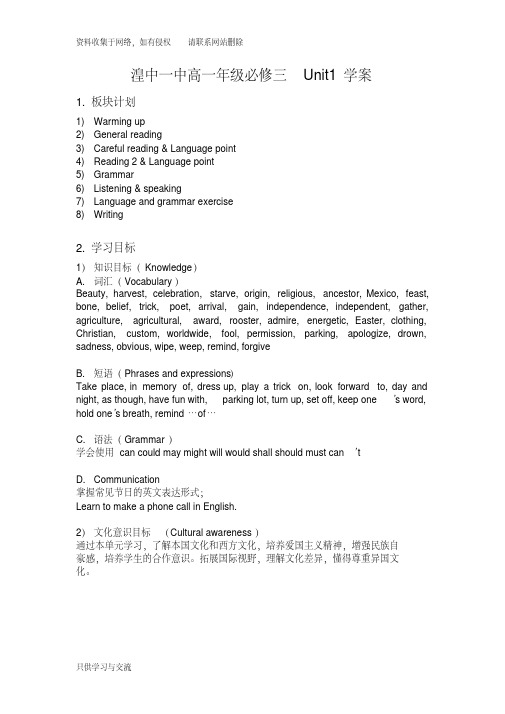
Dates Jan. 1st Mar. 8 th Apr. 5 th May 1 st May 4 th Jun. 1 st Sep. 10th Oct. 1 st The 1st day of the first
lunar month The 15th day of the first
lunar month The 5th day of the fifth
12. I tried aerobics ( 有氧运动 ) but it was too ________ for me.
13. He’ s deeply ________ and goes to church twice a week.
只供学习与交流
资料收集于网络,如有侵权 请联系网站删除
II. General Reading
2) Spring Festival words :
春节 农历 正月
过年 敬酒 红包 禁忌
the Spring Festival Lunar calendar lunar January, the first month by lunar calendar have the Spring Festival propose a toast red packets, lucky money taboo
资料收集于网络,如有侵权 请联系网站删除
2. 课前小组讨论(使用上页词汇进行一问一答练习)
Question What is the festival called? When is it celebrated? How is it celebrated? How is it celebrated? What is eaten? What are the stories about it?
【2018——2019学年人教版高一英语】必修三 unit 1 _教案-最新学习文档
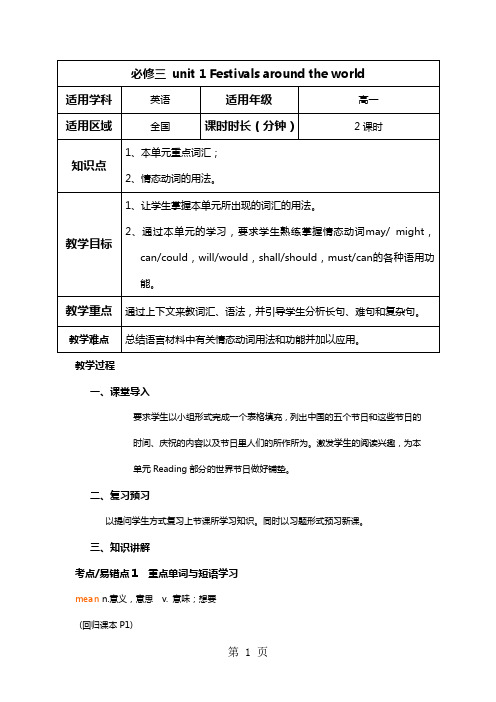
教学过程一、课堂导入要求学生以小组形式完成一个表格填充,列出中国的五个节日和这些节日的时间、庆祝的内容以及节日里人们的所作所为。
激发学生的阅读兴趣,为本单元Reading部分的世界节日做好铺垫。
二、复习预习以提问学生方式复习上节课所学习知识。
同时以习题形式预习新课。
三、知识讲解考点/易错点1 重点单词与短语学习mean n.意义,意思v. 意味;想要(回归课本P1)Festivals are meant to celebrate important times of year.[归纳拓展]mean to do 打算做某事be meant to do 被要求做…mean doing 意味着….eg. I never meant him to work for us.Passing the entrance examination means being admitted into college.take place发生(回归课本P1)Discuss when they take place, what they celebrate and what people do at that time. [归纳拓展] take place/happen/occur/break out/come about(1)take place 其“发生”是按意图或计划进行,无偶然性,无被动语态。
(2)happen “发生”,常指具体客观事物或情况的发生,含有“偶然”的意味。
当以具体事物、事件作主语时,happen 和occur 可以换用;但当happen用作“碰巧”之意时,不能用occur代替,但可以与come about 互换。
用法是happen to do sth.,无被动语态。
(3)occur发生,出现, 较正式用语,可指事情偶然地、意外地发生或思想突然浮在心头。
occur to 有“想起”的意思。
指具体事物时可与happen互换(但happen to do不可换成occur to do);另外occur 有“突然想起”的意思,此时不可与happen 互换,如A good idea occurred to him.(4)break out (战争、火灾等)爆发;(疾病)突然发生。
高中英语人教版(2019)必修第三册学案:Unit1 Festivals and Celebrations-Reading and Thinking
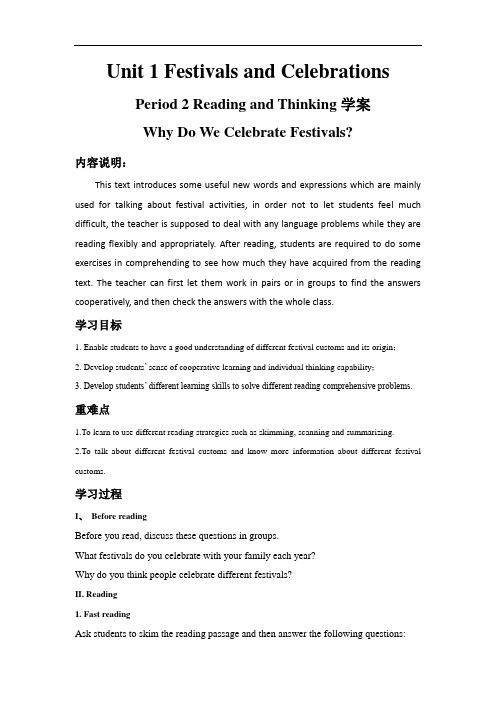
Unit 1 Festivals and CelebrationsPeriod 2 Reading and Thinking学案Why Do We Celebrate Festivals?内容说明:This text introduces some useful new words and expressions which are mainly used for talking about festival activities, in order not to let students feel much difficult, the teacher is supposed to deal with any language problems while they are reading flexibly and appropriately. After reading, students are required to do some exercises in comprehending to see how much they have acquired from the reading text. The teacher can first let them work in pairs or in groups to find the answers cooperatively, and then check the answers with the whole class.学习目标1. Enable students to have a good understanding of different festival customs and its origin;2. Develop students’ sense of cooperative learning and individual thinking capability;3. Develop students’ different learning skills to solve different reading comprehensive problems.重难点1.To learn to use different reading strategies such as skimming, scanning and summarizing.2.To talk about different festival customs and know more information about different festival customs.学习过程I、Before readingBefore you read, discuss these questions in groups.What festivals do you celebrate with your family each year?Why do you think people celebrate different festivals?II. Reading1. Fast readingAsk students to skim the reading passage and then answer the following questions:People all over the world celebrate different festivals because:They would like toFestivals2、In pairs, discuss the following questions.(1)What do most festivals seem to have in common? Why do you think people around the world find these things important?(2)How do you feel about festival customs that have already faded away?(3)W hat is the writer’s attitude towards the commercialization of festivals?III、Read the text again and underline the topic sentence of each paragraph that gives the main idea.Discuss the change about the festival custom. Student discuss related questions on some festivals and traditional customs’ gradual exit from modern life by groups of four, and complete the following table.VI、Analyze the structure of the text and some difficult sentences, and review some important words and sentences. Students complete the gap filling of the text independently. Be sure to use the correct formsVI、HomeworkWrite an article about the festival or celebration based on your notes above.。
2018-2019学年人教版高中英语必修3Unit1Section1(2021年整理)
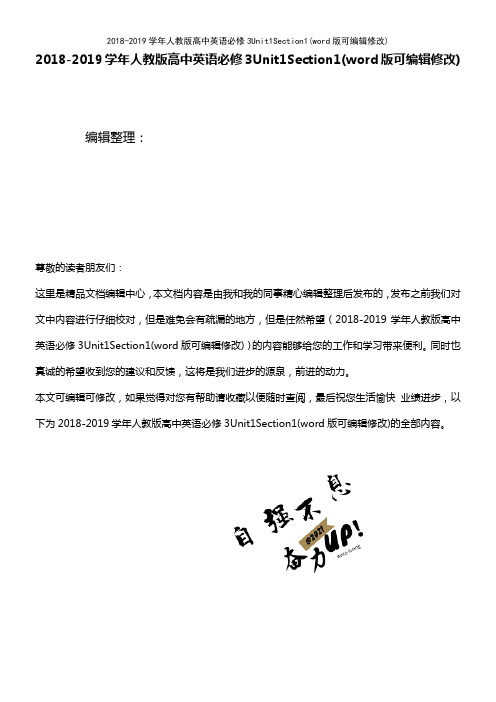
2018-2019学年人教版高中英语必修3Unit1Section1(word版可编辑修改) 编辑整理:尊敬的读者朋友们:这里是精品文档编辑中心,本文档内容是由我和我的同事精心编辑整理后发布的,发布之前我们对文中内容进行仔细校对,但是难免会有疏漏的地方,但是任然希望(2018-2019学年人教版高中英语必修3Unit1Section1(word版可编辑修改))的内容能够给您的工作和学习带来便利。
同时也真诚的希望收到您的建议和反馈,这将是我们进步的源泉,前进的动力。
本文可编辑可修改,如果觉得对您有帮助请收藏以便随时查阅,最后祝您生活愉快业绩进步,以下为2018-2019学年人教版高中英语必修3Unit1Section1(word版可编辑修改)的全部内容。
Unit 1Section ⅠⅠ.单词拼写1.In the old society, thousands of people starved(挨饿) to death for lack of food。
2.I'm still in the belief(观点) that good luck will take place if you keep working hard.3.—Mary is a gifted painter。
—So she is。
She won a national award(奖) at the age of fifteen。
4.Since the independence(独立) from Britain, America has been developing very fast.5.I admire her very much because she is always energetic(精力充沛的).6.It was getting darker and darker, and we waited anxiously for the arrival(到达) of the next bus。
2018-2019版英语新学案同步人教必修三全国通用版讲义Unit 3 Word版含答案
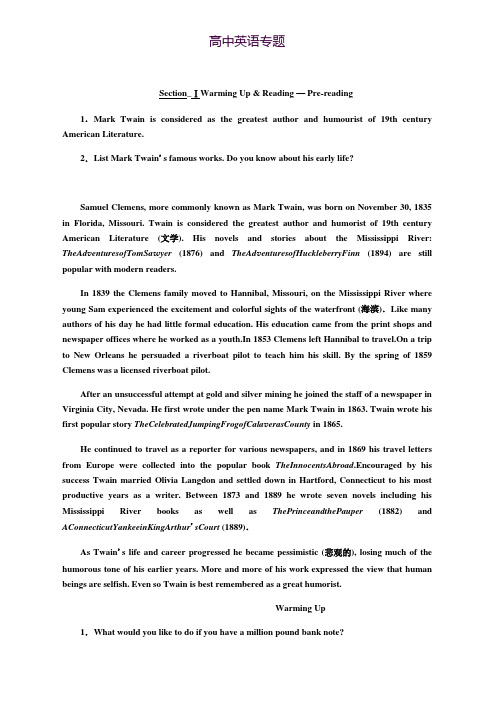
Section_ⅠWarming Up & Reading — Pre-reading1.Mark Twain is considered as the greatest author and humourist of 19th century American Literature.2.List Mark Twain's famous works. Do you know about his early life?Samuel Clemens, more commonly known as Mark Twain, was born on November 30, 1835 in Florida, Missouri. Twain is considered the greatest author and humorist of 19th century American Literature (文学). His novels and stories about the Mississippi River: TheAd v enturesofTomSa w yer(1876) and TheAd v enturesofHuckleberryFinn(1894) are still popular with modern readers.In 1839 the Clemens family moved to Hannibal, Missouri, on the Mississippi River where young Sam experienced the excitement and colorful sights of the waterfront (海滨).Like many authors of his day he had little formal education. His education came from the print shops and newspaper offices where he worked as a youth.In 1853 Clemens left Hannibal to travel.On a trip to New Orleans he persuaded a riverboat pilot to teach him his skill. By the spring of 1859 Clemens was a licensed riverboat pilot.After an unsuccessful attempt at gold and silver mining he joined the staff of a newspaper in Virginia City, Nevada. He first wrote under the pen name Mark Twain in 1863. Twain wrote his first popular story TheCelebratedJumpingFrogofCala v erasCounty in 1865.He continued to travel as a reporter for various newspapers, and in 1869 his travel letters from Europe were collected into the popular book TheInnocentsAbroad.Encouraged by his success Twain married Olivia Langdon and settled down in Hartford, Connecticut to his most productive years as a writer. Between 1873 and 1889 he wrote seven novels including his Mississippi River books as well as ThePrinceandthePauper(1882) and AConnecticutYankeeinKingArthur'sCourt (1889).As Twain's life and career progressed he became pessimistic (悲观的), losing much of the humorous tone of his earlier years. More and more of his work expressed the view that human beings are selfish. Even so Twain is best remembered as a great humorist.Warming Up1.What would you like to do if you have a million pound bank note?I_will_buy_my_favorite_things./I_will_help_the_poor.2.Read the brief introduction to the characters of the play and fill in the blanks.(1)Henry, a poor_American businessman.(2)Two_rich_brothers,_Oliver and Roderick made a bet on what would happen to a person if he was given a million pound bank note.Fast ReadingScan the passage and then choose the best answers according to the passage.1.Why did the two brothers give Henry Adams an envelope?A.Because they wanted to play a trick on Henry.B.Because they had a pity on Henry.C.Because they made a bet.D.Because Henry was not an Englishman.2.How did Henry Adams feel when he got an envelope from the brothers?A.Sad.B.Happy.C.Astonished. D.He took it for granted.3.Henry came to Britain for the first time in his life ________.A.to find a better lifeB.to make an adventureC.all by accidentD.to find the two brothers4.Why did Henry's eyes stare at the leftovers on the brothers' table?A.Because he had never seen such a nice dinner.B.Because he wanted to help them clean the table.C.Because he was very hungry.D.Because he was angry.5.Why was Oliver so happy when hearing Henry say he had no money?A.Because they could do something good for him.B.Because they were interested to find so poor a man.C.Because they could show off their bank note to him.D.Because they finally found the right person for their bet.答案:1~5CCCCDCareful Reading1.Read the passage and then answer the following questions.(1)Where does Henry Adams come from? Does he know much about London?Henry_comes_from_San_Francisco.No,_he_doesn't_know_London_at_all.(2)Why did he land in Britain?Because_he_was_sailing_out_the_bay_when_he_was_carried_out_to_sea_by_a_strong_win d_and_was_saved_by_a_ship_for_London.2.Read the passage and put the following statements in the correct order according to the development of the story.(1)______A.Henry promises not to open the letter until one and a half hours later.(2)______ B.Henry introduces himself to the two rich brothers.(3)______ C.The two rich brothers give a letter with a bank note in it to Henry.(4)______ D.The two rich brothers invite Henry to their big and beautiful house.(5)______ E.Henry wanders on the streets of London,hungry and alone.(6)______ F.Henry decides to accept the money.(7)______ G.Henry is unwilling to accept the money, for he just wants to have an honestjob.答案:(1)~(7)EDBCGFA3.Read the passage and try to write down the main idea of the passage.The text is a story about a(n) (1)Americanbusinessman who is lost in London but is (2)fortunate/luckyenough to be invited to a big house by two rich brothers and (3)given an envelope with a million pound bank note in it by them who have made a bet.SummaryRead the passage carefully and fill in the blanks.Sailing home, Henry, a San Francisco businessman, found himself 1.carried (carry) out to sea by a strong wind. When he had just about given himself up for lost, he 2.was_spotted (spot) by a ship, so he landed in London 3.by accident. Hungry and alone, he walked on the streets of the city when he was 4.unexpectedly (expect) called into a mansion, 5.where two rich brothers, Oliver and Roderick, gave him a letter and told him not to open it till two o'clock of the day. Not 6.knowing (know) it was a million pound bank note, Henry left the mansion and went into a cheap restaurant to stuff his stomach. Everybody was rude to him 7.because/as he was in rags and looked depressed. Then, to the surprise of everybody, he handed the owner a million pound bank note to pay 8.for the meal. Seeing the note, all the people in the restaurant became polite and tried their best 9.to_please (please) Henry. Don't you think it's 10.the most incredible tale in the world?DiscussionThink about what kind of person Henry was.(1)He_was_honest.(It_is_my_first_trip_here.Well,_to_be_honest,_I_have_none.Well,_I_can't_say_that_I_have_any_plans.)(2)He_was_hard-working.(I_earned_my_passage_by_working_as_an_unpaid_hand.Could_you_offer_me_some_kind_of_work_here?I_don't_want_your_charity,_I_just_want_an_honest_job.)Section_ⅡWarming Up & Reading — Language Points(一)根据英文释义和首字母提示写出单词1.scene:a part of a film, movie play in which the action happens in one place or is of one particular type2.seek:to look for somebody or something3.contrary:different from something; against something4.wander:to walk slowly around or to a place, often without any particular sense of purpose or direction5.account:to give a satisfactory explanation of why something has happened or why you did something6.spot:to notice something, especially something that is difficult to see, or that you are looking for7.fault:the responsibility for something wrong that has happened or been done8.stare:to look at something or someone for a long time without moving your eyes(二)用所给词的适当形式填空9.I'll save every penny and say no to any unnecessary spending, otherwise I will be penniless.(penny)10.The reporters have obtained permits to attend the meeting but they are not permitted to photograph.(permit)11.We should have the patience to be patient with the patients suffering a lot.(patience)1.scene n.(戏剧)一场;现场;场面;景色形象记忆★背诵佳句培养语感(鲜活例句)They rushed to the scene of the traffic accident.他们火速赶到车祸的现场。
2018-2019学年高一英语人教版必修三重点点拨学案Unit1PeriodTwoWord版含答案

Period Two Warming Up & Reading—Language Points一、词汇过关基础词汇1.harvest n.& v.收获;收割2.ancestor n.祖先;祖宗3.feast n.节日;盛宴4.bone n.骨;骨头5.trick n.诡计;恶作剧;窍门;v t.欺骗;诈骗6.poet n.诗人7.gain v t.获得;得到8.gather v t.& v i.搜集;集合;聚集9.award n.奖;奖品;v t.授予;判定10.custom n.习惯;风俗拓展词汇1.beauty n.美;美人→beautiful adj.美丽的2.celebration n.祝贺;庆贺→celebrate v.庆祝3.starve v i.& v t.(使)饿死;饿得要死→starvation n.挨饿;饿死4.origin n.起源;由来;起因→original adj.最初的;原始的5.religious adj.宗教上的;信奉宗教的;虔诚的→religion n.宗教6.belief n.信任;信心;信仰→believe v.相信;认为7.arrival n.到来;到达;到达者→arrive v i.到达8.independence n.独立;自主→independent adj.独立的;自主的9.agriculture n.农业;农艺;农学→agricultural adj.农业的;农艺的10.energetic adj.充满活力的;精力充沛的;积极的→energy n.精力;能量联想归纳1.构词法[规则]in-(否定前缀)+dependent(依赖的)→independent独立的;自主的[联想](1)informal非正式的(2)incomplete不完整的(3)invisible看不见的(4)inconvenient不方便的2.话题词汇——与节假日活动有关的词汇(1)festival n.节日(2)celebration n.庆祝(3)in memory of纪念;追念(4)feast n.节日;盛宴(5)dress up穿上盛装;打扮(6)parade n.游行;阅兵;检阅(7)Jesus耶稣二、短语互译汉译英1.take place发生;举行2.in memory of 纪念;追念3.dress up 穿上盛装;打扮;装饰4.play a trick on 搞恶作剧;诈骗;开玩笑5.look forward to 期望;期待;盼望6.day and night 日夜;昼夜;整天7.have fun with 玩得开心英译汉1.do harm (to sb.)(给某人)带来危害2.in the shape of skulls 呈颅骨的形状3.gain India’s independence 赢得印度的独立4.decorate...with... 用……装饰……5.get together 聚会;聚集6.lucky money in red paper 红纸包着的压岁钱7.be proud of 为……而自豪三、重点句式教材原句1.At that time people would starve if food was difficult to find,especially during the cold winter months.在那个时候,尤其是在寒冷的冬季,如果难以找到食物,人们就会挨饿。
高中英语Unit1《Festivals around the world》学案(2)(新人教版必修3)教案
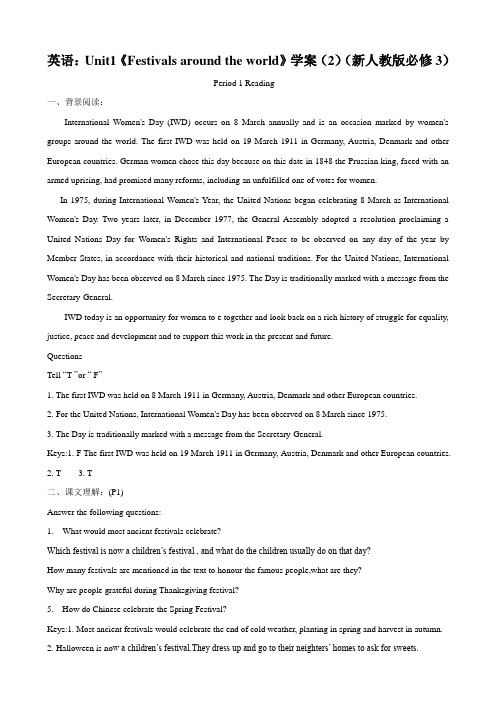
英语:Unit1《Festivals around the world》学案(2)(新人教版必修3)Period 1 Reading一、背景阅读:International Women's Day (IWD) occurs on 8 March annually and is an occasion marked by women's groups around the world. The first IWD was held on 19 March 1911 in Germany, Austria, Denmark and other European countries. German women chose this day because on this date in 1848 the Prussian king, faced with an armed uprising, had promised many reforms, including an unfulfilled one of votes for women.In 1975, during International Women's Year, the United Nations began celebrating 8 March as International Women's Day. Two years later, in December 1977, the General Assembly adopted a resolution proclaiming a United Nations Day for Women's Rights and International Peace to be observed on any day of the year by Member States, in accordance with their historical and national traditions. For the United Nations, International Women's Day has been observed on 8 March since 1975. The Day is traditionally marked with a message from the Secretary-General.IWD today is an opportunity for women to e together and look back on a rich history of struggle for equality, justice, peace and development and to support this work in the present and future.QuestionsTell “T ”or “ F”1. The first IWD was held on 8 March 1911 in Germany, Austria, Denmark and other European countries.2. For the United Nations, International Women's Day has been observed on 8 March since 1975.3. The Day is traditionally marked with a message from the Secretary-General.Keys:1. F The first IWD was held on 19 March 1911 in Germany, Austria, Denmark and other European countries.2. T3. T二、课文理解:(P1)Answer the following questions:1. What would most ancient festivals celebrate?Which festival is now a children’s festival , and what do the children usually do on that day?How many festivals are mentioned in the text to honour the famous people,what are they?Why are people grateful during Thanksgiving festival?5. How do Chinese celebrate the Spring Festival?Keys:1. Most ancient festivals would celebrate the end of cold weather, planting in spring and harvest in autumn. 2. Halloween is no w a children’s festival.They dress up and go to their neighters’ homes to ask for sweets.3. Three festivals are mentioned to honour famous people. They are the dragon Boat Festival in China, Columbus Day in the USA, the National Festival in India.4. People are grateful because their food is gathered for the winter and the agricultural work is over.5. At the Spring Festival in China, people eat dumpings, fish and meat and may give children lucky money in red paper.There are dragon dances and carnivals, and families celebrate the Lunar New Year together.三、课文理解:(P7)Put the statements on the passage A Sad Love Story in correct order.Li Fang met Hu Jin at the tea shop on the corner on his way home.Hu Jin told Li Fang she would meet him at the coffee shop after work.Li Fang felt much regretted having misunderstood Hu Jin and missed the date with her.The manager of the coffee shop turned on the TV on which was a sad Chinese love story being told.Li Fang threw away flowers and chocolates bought for Hu Jin.Li Fang thought the love story between him and Hu Jin were like that between Niulang and Zhinu.Hu Jin didn’t turn up and Li Fang felt much disappointed and depressed.8. The manager of the TV programme expressed her hope that everyone could meet the one he or she loved that day.The correct order: _______________________________________Key: 2. 7. 4. 6. 8. 5. 1. 3.Period 2Language points(1)1. [原文再现]Most ancient festivals would celebrate the end of cold weather, planting in spring and harvest autumn. (P1) 最古老的节日总是庆祝严寒的结束,春季的种植和秋天的收割。
人教版高中英语必修3全册学案
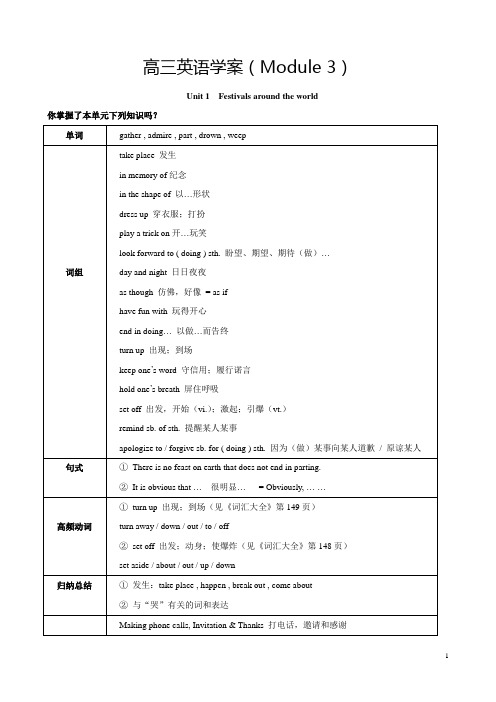
高三英语学案(Module 3)Unit 1 Festivals around the world你掌握了本单元下列知识吗?1. gather (见《词汇大全》第63页)(vt.)聚集,归拢;增加(速度、力量等);(云层、黑暗等)逐渐增加,积聚;积聚(力量、精神等);使做好准备【课文原句】People are grateful because their food is gathered for the winter and the agricultural work is over. 【重要词组】gather courage to do sth. 鼓起勇气做某事(也可用take)【举例】①人们慢慢地把他们的所有物收集起来,然后离开了大厅。
②这辆车在加速。
③暴雨云层在聚集。
④他重拾信心做最后一搏。
⑤我坐了一会儿以积聚力量。
2. admire (见《词汇大全》第4页)(vt.)钦佩;赞美;羡慕;欣赏【课文原句】China and Japan have mid-autumn festivals, when people admire the moon and in China, enjoy mooncakes.【重要词组】admire sb. for ( doing ) sth. 钦佩/ 羡慕/ 赞美某人(做)某事【举例】①中秋节,中国人有赏月的习俗。
②她每天对着镜子孤芳自赏。
③我们很钦佩他的睿智和勇敢。
3. part (见《词汇大全》第97页)(n.)部分;作用;成分;零件;角色(vt./ vi.)(使)分开;(使)分离;断绝关系(adv.)partly 在某种程度上;部分地【课文原句】There is no feast on earth that does not end in parting.【重要词组】take part in 参加play a part in 在…中起作用/ 扮演角色part with sth. (不情愿)放弃;与…分开【举例】①他们轻轻地拥抱了一下便分别了。
高中英语Unit1SectionⅠReadingandThinking学案新人教版必修第三册(含答案
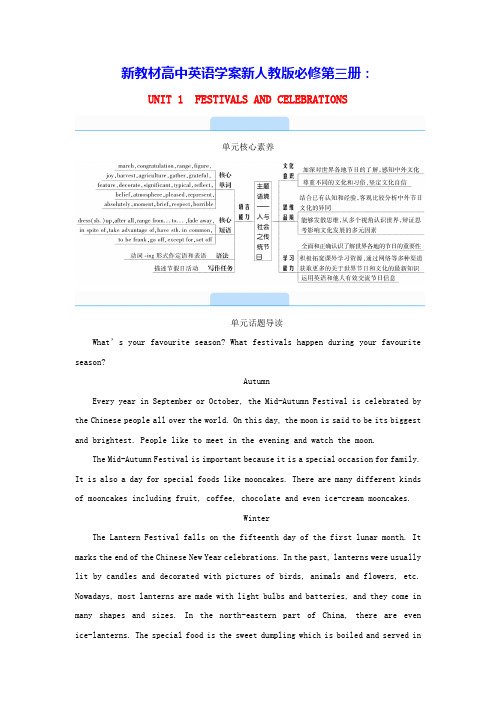
新教材高中英语学案新人教版必修第三册:UNIT 1 FESTIVALS AND CELEBRATIONS单元核心素养单元话题导读What’s your favourite season? What festivals happen during your favourite season?AutumnEvery year in September or October, the Mid-Autumn Festival is celebrated by the Chinese people all over the world. On this day, the moon is said to be its biggest and brightest. People like to meet in the evening and watch the moon.The Mid-Autumn Festival is important because it is a special occasion for family. It is also a day for special foods like mooncakes. There are many different kinds of mooncakes including fruit, coffee, chocolate and even ice-cream mooncakes.WinterThe Lantern Festival falls on the fifteenth day of the first lunar month. It marks the end of the Chinese New Year celebrations. In the past, lanterns were usually lit by candles and decorated with pictures of birds, animals and flowers, etc. Nowadays, most lanterns are made with light bulbs and batteries, and they come in many shapes and sizes. In the north-eastern part of China, there are even ice-lanterns. The special food is the sweet dumpling which is boiled and served inhot water.SummerThe Dragon Boat Festival falls on the fifth day of the fifth month of the lunar year. As it is in early summer, it marks the beginning of the hottest season of the year. The tradition of the Dragon Boat Festival started more than 2, 000 years ago. In the old days, dragon boat races were organised only by Chinese people. However, in recent years, people from other cultures have also taken part in the races and enjoyed the fun. There is a special food for the festival. It is called zongzi, which is sticky rice in fresh bamboo leaves.Section ⅠListening and Speaking,Reading and Thinking课前自主预习Ⅰ.重点单词1.__lantern__ n.灯笼;提灯2.__costume__ n.(某地或某历史时期的)服装;戏装3.__march__ vi. & n.行进;前进;示威游行4.__congratulate__ vt. 向(某人)道贺;(因某事)为自己感到自豪→__congratulation__ n.祝贺;恭喜5.__riddle__ n.谜语;神秘事件6.__ceremony__ n.典礼;仪式7.__range__ n.一系列;范围,界限vi. 包括;(在一定范围内)变化8.__origin__ n.起源;起因;出身→__originate__ vi. 起源→__original__ adj. 原来的;最初的n.原件;正本;原稿→__originally__ adv. 原来;起初9.__religion__ n.宗教;宗教信仰→__religious__ adj. 宗教的;笃信宗教的10.__figure__ n.人物;数字;身材vt. 认为;认定11.__charm__ n.魅力;迷人的特征;咒语→__charming__adj. 令人着迷的;迷人的;吸引人的12.__joy__ n.高兴;喜悦→__joyful__ adj. 高兴的;快乐的13.__gratitude__ n.感激之情;感谢→__grateful__ adj. 感激的;表示感谢的14.__harvest__ n.收获季节;收获;收成vi. & vt. 收割(庄稼);捕猎(动物、鱼) 15.__agriculture__ n.农业;农艺→__agricultural__ adj. 农业的16.__crop__ n.庄稼;作物;一季的收成17.__gather__ vi. 聚集;集合vt. 聚集;搜集;收割→__gatherer__ n.采集者→__gathering__ n.聚集;聚会18.__feature__ vt. 以……为特色n.特色;特征;特点19.__decorate__ vt. 装饰;装潢→__decoration__ n.装饰物→__decorative__ adj. 装饰的20.__church__ n.(基督教的)教堂;礼拜堂21.__significant__ adj. 有重大意义的;显著的→__significance__ n.意义;含义;重要性22.__fade__ vi. & vt. 逐渐消失;(使)褪色;(身体)变得虚弱23.__typical__ adj. 典型的;有代表性的;平常的→__typically__ adv. 典型地,有代表性地;向来,一向→__type__ n.类型;种类24.__evil__ adj. 邪恶的;有害的;罪恶的n.邪恶;罪恶;恶行25.__commercial__ adj. 商业(化)的;以获利为目的的→__commercialis(z)e__ vt. 使商业化;利用……牟利→__commercialis(z)ation__ n.商业化26.__medium__ n.(pl. media)媒介;手段;方法adj. 中等的;中号的27.__reflect__ vt. 显示;反映;反射→__reflection__ n.映像;思考;反映28.__belief__ n.信仰;信心;信任→__disbelief__ n.不信;怀疑;疑惑→__believe__ vt. & vi. 相信29.__faith__ n.宗教信仰;信任;相信→__faithful__ adj. 忠实的→__faithfully__ adv. 忠实地30.__occasion__ n.特别的事情(或仪式、庆典);(适当的)机会Ⅱ.重点短语1.dress (sb. ) __up__穿上盛装;装扮2.after __all__毕竟;别忘了3.range __from__…to… 从……到……之间变化4.fade __away__逐渐消失;(身体)变得虚弱5.__in__ spite of不管;尽管6.take advantage __of__利用;欺骗;占……的便宜7.__the__ media大众传播媒介8.have sth. __in__ common (兴趣、想法等方面)相同;有相同的特征9.__take__place举行;发生10.decorate… __with__…用……装饰11.play a role __in__在……中起作用12.__with__the development of随着……的发展13.drive __away__驱赶;驱车离开Ⅲ.重点句型1.However,__no matter how__ different they may seem,all over the world,the spirit of sharing joy,gratitude,love,or peace is common in all festivals.然而,无论它们看起来多么不同,在这个世界上,分享快乐、感恩、爱或和平的精神是所有节日共有的。
人教版高中英语必修第3册 Unit 1 Reading for Writing导学案

3.学习准备:
准备好必修三课本和笔记本。
4.学习方式和环节:
按老师指令完成相应的课上练习,学习环节主要有:
了解学习目标,进入文本阅读。第一遍阅读,回答两个概括性பைடு நூலகம்问题 第二遍阅读回答两个开放性问题 第三遍阅读,分析文章的结构和语言特点应用三种句型改写句子 根据表格梳理自己文章的内容和结构,进而进行写作练习 根据评价表自行修改自己的文章 阅读例文,借鉴其中好的内容和语言,再次修改自己的文章
导学案
1.课题名称:
人教版高一必修三英语——Unit1 Reading for writing
2.学习目标:
In this class, you will:
1. Acquire the information about Naadam Festival
2. Analyze the organization and language features of the diary
- 1、下载文档前请自行甄别文档内容的完整性,平台不提供额外的编辑、内容补充、找答案等附加服务。
- 2、"仅部分预览"的文档,不可在线预览部分如存在完整性等问题,可反馈申请退款(可完整预览的文档不适用该条件!)。
- 3、如文档侵犯您的权益,请联系客服反馈,我们会尽快为您处理(人工客服工作时间:9:00-18:30)。
Section_ⅢGrammar—情态动词(Ⅰ)语法图解探究发现①Festivals can also be held to honour famous people.②Some festivals are held to honour the dead or to satisfy the ancestors, who might return either to help or to do harm.③Most ancient festival would celebrate the end of cold weather, planting in spring and harvest in autumn.④For the Japanese festival Obon, people should go to clean graves and light incense in memory of their ancestors.[我的发现]以上四个句子都使用了情态动词。
其中,第①句中的can表示许可,意为“可以”;第②句中的might表示推测,意为“可能会”;第③句中的would表示过去习惯性动作,意为“过去常会”;第④句中的should表示劝告或建议,意为“应该”。
一、基本特征1.情态动词有一定的词义,不能单独作谓语,需和实义动词或系动词一起作谓语。
She can speak English though she is six.尽管她才6岁,但她会说英语。
2.情态动词一般无人称和数的变化,个别情态动词有现在时和过去时两种时态变化。
They must be in the classroom.他们一定在教室里。
3.构成否定句时,not放在其后面。
The young man can't carry the big stone.这个年轻人搬不动那块大石头。
4.情态动词后接动词原形。
You will do as I told you.你得照我说的去做。
[即时演练1]补全句子①(2017·北京高考改编)Samuel, the tallest boy in our class, can_easily_reach_the_books on the top shelf.塞缪尔是我们班最高的男孩,他能轻松地够到书架顶层上的书。
②We should__study_hard for our motherland and ourselves.为了我们的祖国和我们自己,我们应该努力学习。
二、基本用法1.can与could的用法(1)表示能力:can用来表示现在的能力,could表示过去的能力。
I can play basketball now, but I couldn't when I was young.现在我会打篮球了,但小时候我不会。
(2)表示请求和许可:could语气比can委婉,但回答时只能用can。
Can/Could you lend me a hand?你能帮我一下吗?(3)表示推测,意为“可能”。
多用于否定句或疑问句。
—Can he be in the reading room now?—No, he can't be in it.Because I saw him in the office just now.——他现在可能在阅览室吗?——不,他不可能在(阅览室)。
因为我刚刚在办公室看见他了。
(4)表示理论上或习惯上的可能性,意为“可能会”。
Jogging can be harmful to the health.慢跑可能会对身体健康有害。
[辨析比较]can, be able to表示“能力”时的区别Babies婴儿们刚生下来时会游泳。
(自身具有的能力)Without his hard work,he was not able to get good grades.如果没有他的努力工作,他是不可能取得好成绩的。
(经过努力)[即时演练2](1)选出下列句中can/could的含义A.表示能力B.表示推测C.表示请求和许可D.表示理论或习惯上的可能性①I believe that he can't be so rude._B_②I can speak English fluently while he can't._A_③Scotland can be very warm in September._D_④—Could you please clean this room?—Yes, I can._C_(2)选词填空:can, be able to①He can give you some advice on how to learn English.②At last, they were_able_to escape from the fire.2.may与might的用法(1)表示征求对方的许可或允许(不用might)对方做某事。
—May I come in?—Yes, you may/can.——我可以进来吗?——是的,你可以进来。
(No, you can't.不行,你不能进来。
)You may go now.你现在可以走了。
(2)表示推测(把握不大),意为“可能”,多用于肯定句。
might比may可能性更小。
He may come, or he may not.他可能来,也可能不来。
It may/might rain this afternoon.You'd better take a raincoat with you.今天下午可能会下雨。
你最好带上雨衣。
(3)may用于祈使句,表示祝愿。
May you succeed!祝你成功!May you have a good journey!祝你旅途愉快![即时演练3]写出下列句中may的用法①May you be happy!表示祝愿②I think he may come today.表示推测③You may keep the book for 2 weeks.表示许可3.will与would的用法(1)表示意志或意愿,意为“会;想;要”等。
多表示从主语的主观意志出发,愿意做某事。
We will do our best to save the child.我们会尽力抢救这个孩子。
I have asked her, but she won't help us.我已经问过她了,但她不会帮助我们的。
(2)表示请求或建议,多用于疑问句。
would语气更委婉。
Would you please open/Would you mind opening the window for me?请你为我打开窗户好吗?Would you pass me the bottle?请你递给我那个瓶子好吗?(3)表示习惯性动作或客观真理,意为“总是;老是”。
will表示现在,would 表示过去。
She will listen to music alone in her room for hours.她独自在房间里听音乐,往往一听就是几小时。
Oil will float on water.油总是浮在水面上。
On Sunday he would go to the park to play chess.以前每到星期天他总是到公园去下棋。
[辨析比较]would, used to过去,他一有空就去公园。
(动作反复发生,现在还有可能再去)I used to go to work by bike, but now I go to work by car.我过去常常骑车上班,但是现在我开车上班。
[即时演练4]补全句子①My parents won't_allow_me__to_stay out late.我的父母不会允许我在外面待得很晚。
②He would_get_up_early when he lived in the country.他住在乡下时总是起得很早。
③People used_to_believe that the earth was flat.过去,人们认为地球是扁平的。
④Some vegetables will_get_burnt in such hot weather.有些蔬菜在炎热的天气下会烤焦。
4.shall与should的用法(1)shall用于疑问句中多表示征求建议,主要用于第一、三人称。
When shall he be able to leave the hospital?他什么时候能出院?(2)用于肯定句中多表示说话者的允诺、告诫、威胁、命令、规定、必然性等,主要用于第二、三人称。
Persons under 18 shall not be employed in night work.不满十八岁的人不得雇用干夜间工作。
(3)should表示劝告或建议,意为“应该;要”。
We should help others when they are in trouble.当别人有困难时,我们应该帮助他们。
(4)should表示义务或责任,意为“应该;理应”。
We should learn from each other.我们应该互相学习。
(5)should表示推测,意为“应该;可能”。
If the train is on time, she should arrive in Beijing by seven o'clock.如果火车准点的话,她应该在7点钟到达北京。
(6)should表示惊讶或意外,意为“竟然”。
It's strange that he should come so late.他竟然来这么迟真是奇怪。
[即时演练5]补全句子①You shall_have that book tomorrow.你明天可以拿到那本书。
②If you can't come, I shall_not_tell you the news.如果你不来,我就不告诉你这个消息了。
③Children should_be_told the truth.孩子们应该被告知真相。
5.must的用法(1)must表示命令或强烈的建议,意为“必须”。
All the students must obey the school rules.所有学生必须遵守校规。
(2)表示十分肯定的推测,意为“一定;准是”。
Betty must be in the next room.I can hear her talking there.贝蒂肯定在隔壁房间。
